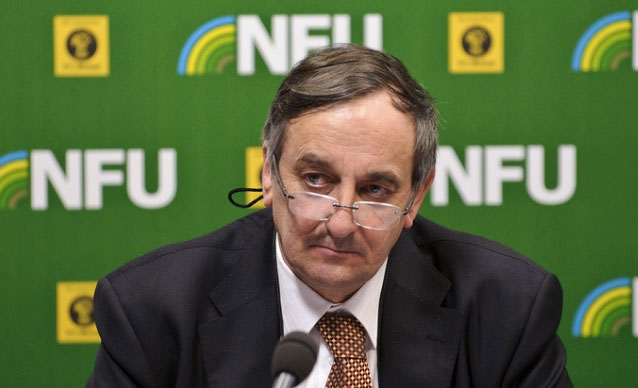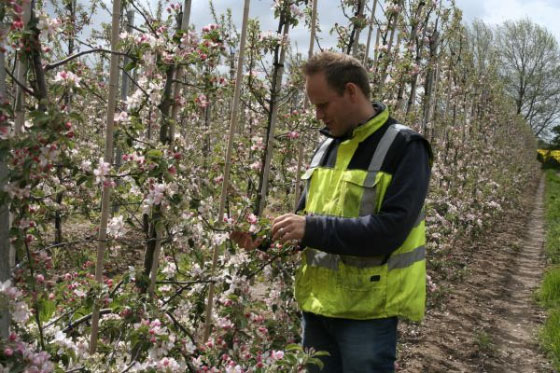
Britain would run out of food if it relied only on home-grown produce, the National Farmers' Union have warned.
In 2013 the UK was 55 per cent self-sufficient in vegetable production and 10 per cent self-sufficient in fruit production, according to Defra’s latest horticultural statistics. Overall, self-sufficiency in fresh produce has decreased from 46 per cent in 2000 to 34 per cent in 2013.
Imports account for 65 per cent of fresh produce consumed in the UK, with the majority coming from other EU Member States.
Imports offer consumers a wide range of fresh produce outside the UK growing season and varieties which simply cannot be grown in the UK. It will always remain a vital element of the UK’s food security.

"The NFU has a green light to increase UK production, but we need to be realistic about the potential for the UK to become totally self-sufficient," the Fresh Produce Consortium said.
"The UK’s climate will always limit the range of produce which can be grown here, which is why imported produce is such a key component to the nation’s healthy eating habits and meets the expectations of our diverse population.
"FPC has worked with Defra and others to encourage British growers to expand their market share, particularly among the food service and wholesale sectors which can be overlooked by some British growers.
"There are over 400 different types of fresh produce available in the UK, not all of which can be grown in the UK. However, if UK growers want to more self-sufficient they should consider going beyond the more traditional products which they offer currently."
The latest statistics reveal we are 60 per cent self-sufficient in food – meaning we produce enough food to last for 219 days. In 1991 self-sufficiency was 75 per cent and the figure has also dropped by two per cent since last year.
NFU President Meurig Raymond said: “To think UK food would only last until August 7 without imports is an alarming notion. But looking back over the last two decades and seeing the downward slope in self-sufficiency says to me – this needs to change.”
Consumers want to buy British food with 86 per cent of shoppers keen to buy more traceable food produced from British farms and our farmers are geared up to produce more.
The NFU is therefore encouraging consumers, retailers, politicians and the wider food industry to Back British Farming. By supporting our farmers it offers them the confidence to produce more.
“What we need now is for farming to be at the heart of decision-making across the wider food industry and government, to allow for more food to be both produced and consumed here, in the UK,” Raymond said.
British farmers produce meat, fruit, vegetables and herbs year round with the use of clever innovations and technologies.
East Anglia grower, Patrick Bastow, produces lambs lettuce and other baby leaf salad leaves throughout the year undercover. Rainwater is captured and specialist machinery harvests the crop to ensure efficiency is maximised.
Other farmers are experimenting with crops that have traditionally been imported. Essex farmer, Peter Thompson, now grows a commercial crop of figs, and has successfully trialled Asian herbs such as lemongrass on his farm. By experimenting he has diversified his enterprise and managed to produce a more unusual crop for the British public.
“From travelling across the country, I see fantastic farms on a daily basis that are efficient and productive businesses ready to produce more.
“Our aim is to ensure the country – consumers, politicians, retailers and the wider food industry - is backing British farming, and within this, a solid plan for agricultural growth to ensure the current self-sufficiency trend is reversed and long-term food security is supported,” said Meurig.
Peter Thompson is a third-generation fruit and vegetable grower on the Tendring Peninsula near Harwich who is pursuing several innovative projects to transform the farming business, with new crops and a reduced environmental impact. His business illustrates the potential of the wider farming industry to produce more food given the right signals.
Innovations on the farm include:
- A reservoir that is filled with ‘grey’ water supplied by runoff from a road and housing development opposite the farm
- A commercial orchard of fig trees, one of the first in the country
- New technology installed in the farm’s cold store to reduce electricity consumption
- A half a hectare trial orchard of opal apples, planted with partners Tendring Fruit, which is designed to test whether apple production can be truly sustainable.
- Commercial orchards of braeburn apples and conference pears, planted more densely than traditional orchards and fed by drip irrigation to increase productivity
- Peter has also just completed a successful aquaponics trial where herbs including lemon grass, Thai basil and kang kong were grown in a closed system using fertiliser supplied by live fish, with plant beds to clean and recycle the water. He is now taking this forward into commercial production.
“It is incredibly important that we look after our local and wider environment and we take this responsibility seriously,” said Peter, managing director of the business.
“We manage the farm sensitively to try to encourage wildlife and to ensure we reduce our impact on the wider, global environment.”
